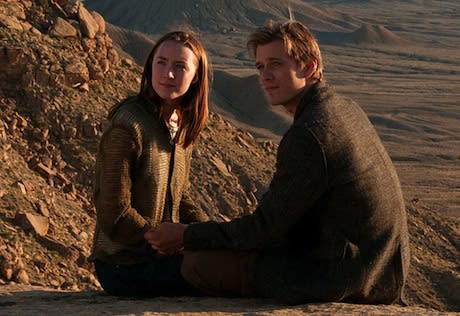During the supplemental interview segments included with the Blu-Ray of The Host, writer Stephenie Meyer points out that this is her most complex work, expanding upon the idea of what it's like to have dual inner-voices in a female body. Acknowledging the intellectual limitations of her Twilight series, she's clever enough to only hint at what this persistent inner-conflict might represent specifically to women, knowing that it has the possibility to alienate a broader audience, just as the political implications of the text could. Director Andrew Niccol, whose library of auteur works is highly didactic in their incisive political and social commentary, is less vague. While he doesn't say anything incendiary on the supplemental materials, his vision and approach to the work are stark, cold, exact and terrifyingly calculated. Employing a glistening sheen of silver-blue aesthetics to juxtapose the oft-bright and sunny, wide-open expanse of the desert backdrop throughout the second half of the film, his very still, tightly composed approach is as alien and distancing as the metallic, sparsely decorated look. Even early on, when our conflicted protagonist, Melanie (Saoirse Ronan), is captured by a group of humans possessed by glowing, vaginal, alien body snatchers, there's something static and hollow about it all. Though it's a chase scene that culminates in attempted suicide, all of the kineticism and emotion are removed from the situation, boiling it down to fact, just as the highly sexualized insertion of the tiny alien into a slit in Melanie's neck is almost clinical in its overt presentation of subtextual elements. While this does slow things down, forcing viewers to analyze the work rather than experience (and forget) about it, the structure becomes problematic when the voiceover aspect enters, with the newly infected Melanie having an internal argument with her host, who, for the majority of the film, is referred to as Wanda (the wanderer). Their debate — with Wanda having the calm disposition of the communist invaders that have taken over the Earth and Melanie being a deceptive, emotional (capitalist) human — is given no stylistic visual distinction. It's mostly composed via stark images of Ronan staring at the ceiling with a white background while an overly breathy, panicked voice utters veiled threats and urgent warnings. This is even worse when this conflicted protagonist eventually finds her way back to the underground group of uninfected humans. Melanie maintains her crush on Jared (Max Irons), while Wanda horns after his buddy, Ian (Jake Abel). Because Niccol isn't concerned with this cheesy storyline whatsoever, whereas Meyer was understandably infatuated with the idea, it does little more than pad the running time, free from any sort of passion or subtle jealousies. Instead, the focus is on the hierarchical structure of the humans as deceptive, unpredictable creatures willing to sacrifice each other and act upon unreasonable emotions, in relation to the alien seekers, who work together in harmony, trusting and believing each other implicitly. Both systems have faults, which is what Niccol is excited about revealing, taking things a a step further to indicate that women are implicitly given a secondary, almost contrary sense of rationalizing — two inner voices — compared to the singular simplicity of male structure and order. It's actually quite an appealing topic, but this mixture of political didactics and teen fluff doesn't make for a very cohesive or engaging cinematic experience, leaving everything to feel off and, at times, empty. Had Niccol found a way to acknowledge, and make relevant, the dorky love triangle and inner-conversation dynamic, it could have had a broader reach. Unfortunately, The Host is too rigidly defined to have any sort of appeal to the demographic most likely to seek it out. Still, it is a fascinating failure to experience and dissect.
(eOne)The Host [Blu-Ray]
Andrew Niccol

BY Robert BellPublished Jul 18, 2013



